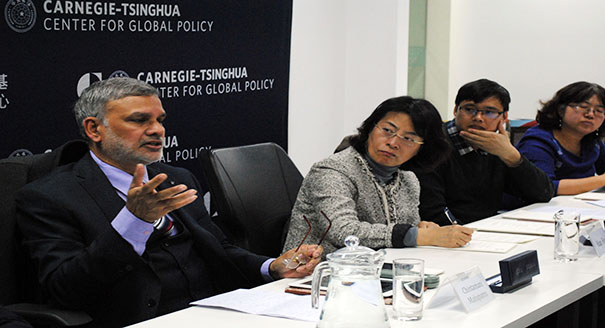Registration
You will receive an email confirming your registration.
Nuclear arms are a cornerstone of the security landscape of the Indo-Pacific region. China is modernizing its arsenal to ensure that its second-strike deterrent capability remains credible, but these efforts have raised security concerns in New Delhi.
A landmark 2008 nuclear cooperation agreement between India and the United States, meanwhile, has allowed India to access foreign nuclear materials and technology and thus build a more advanced nuclear program and produce more fissile materials—a development that Beijing has watched carefully. The complex nuclear dimension of security interactions between the three countries warrant timely conversations about how stable, constructive ties can be maintained.
Carnegie–Tsinghua’s Tong Zhao moderated a discussion with Chinese and Indian scholars about how these countries’ nuclear policies affect regional stability and how these policies can be coordinated to ensure that the security needs of all three countries are met.
Discussion Highlights
- Nuclear Arms and Strategic Trust: Panelists asserted that stable nuclear relations between countries are premised on whether they have stable diplomatic relations more broadly. Some speakers stressed that the level of trust and cooperation between a given nuclear power and its nuclear-armed peers reveals more about nuclear relations between the two countries than the size or quality of either one’s arsenal. To illustrate this point, they pointed out that the United States often worries about Russia’s nuclear arsenal, but has no reservations about those held by U.S. allies like the United Kingdom or France.
- Complex Indo-Pacific Nuclear Ties: Panelists observed that the respective nuclear policies of China, India, and the United States all in turn affect the policy responses of each other, as well as those of other regional nuclear-weapons states such as Russia and Pakistan. They noted, for example, that as the United States continues to develop more sophisticated nuclear arms, it indirectly increases the technological demands on China to maintain an effective, credible second-strike capability. This in turn puts pressure on India to upgrade its own nuclear weapons in response to China’s advances, which has security implications for India’s longtime rival, Pakistan.
- The Lingering Prospect of Nuclear Conflict: Panelists stated that although the likelihood of a nuclear war may be lower in an era with less interstate conflict, the possibility of nuclear accidents occurring cannot be overlooked. They cited several instances of near misses, in which nuclear-armed states mistakenly gave orders to launch nuclear missiles. One panelist posited that the assumption that nuclear-armed states are rational actors that can be trusted to act responsibly may not hold true in all cases. Another panelist asserted that policymakers could help minimize the chances of a nuclear strike by focusing on preventing nuclear wars rather than strategizing about how to win them.
- Guarding Against Nuclear Terrorism: Speakers cited nuclear terrorism as a top concern, singling out non-state actors as a primary threat to the world order. One panelist noted that concepts such as deterrence and second-strike capability likely would not apply to non-state actors, which may not necessarily hold territory for a state to retaliate against if attacked. Participants stated that policymakers should focus on preventing hostile nonstate actors from acquiring a nuclear warhead or radioactive materials. They expressed hope that joint efforts by all nuclear-armed states to counter nuclear terrorism could be the foundation for more stable nuclear relations among them.
- Risks and Rewards of Civilian Nuclear Power: Panelists acknowledged that nuclear-armed states have done much to prevent the spread of nuclear-weapons technology. But they also pointed out that civilian nuclear technologies continue to proliferate, which could pose nearly as much of a risk. Speakers observed that nuclear power plants could be targeted by groups seeking to steal fissile materials. At the same time, they conceded that the growing nuclear energy sector presents a prime opportunity for countries such as China and India to increase cooperation and technology sharing, which may serve not only as a trust-building measure but also a way to speed up their transitions away from dependency on fossil fuels.
Chintamani Mahapatra
Chintamani Mahapatra is the chairman of the Canada, U.S., and Latin American Studies Department at the School of International Studies at Jawaharlal Nehru University.
Tong Zhao
Tong Zhao is an associate at the Carnegie–Tsinghua Center for Global Policy who specializes in nuclear and strategic security issues.
Mao Yue
Mao Yue is the deputy director of the South Asia Research Center at the Chinese Academy of Social Sciences and deputy chief editor of the South Asian Studies journal.
Han Hua
Han Hua is an associate professor at Peking University and director of the Center for Arms Control and Disarmament in the university’s School of International Studies.
Lin Minwang
Lin Minwang is an associate professor at China Foreign Affairs University’s Institute of International Relations. He is an expert on foreign policy analysis and Sino-Indian relations.
